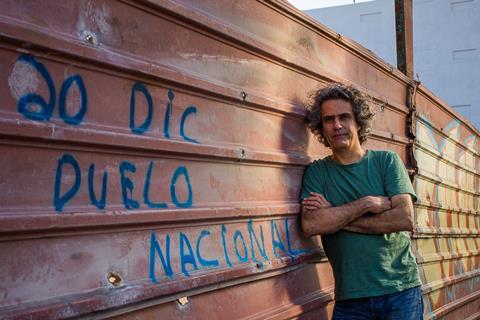
Panama-born Enrique Castro Rios, talks about his fictional feature debut Decembers (Diciembres), which receives its world premiere at IFF Panama on Saturday night (April 7) in Teatro Balboa.
Decembers centres on the US invasion of Panama in 1989 and a reconciliation among survivors a decade later.
Rios was educated at Brown University in the US and earned his masters degree in screenwriting from the University of Bergen in Norway. He worked on independent films in the US and lived in Mali and Taiwan prior to his return to Panama in 1992.
Decembers screens again on Monday at Cinépolis Multiplaza Sala 6.
What is Decembers about?
It’s the story of a fictitious Panamanian photographer who tries to document the US invasion of Panama in December 1989, to denounce it. But he dies in the process. He’s not pre-Noriega, nor is he anti-Yankee; he’s somebody who realises the invasion will be needlessly violent, so he wants to denounce it. He comes back 10 years later to being some survivors towards reconciliation. This is at the time of reversion of the Panama Canal to Panama.
So is this a magical realist drama?
I don’t like the term magical realism. It has fantastical elements that occur in many films from around the world. It’s not specifically Latin American [in flavour]. It’s universal, but it’s informed by magical realism and by documentary – I’m a documentary filmmaker and this is my first fiction feature.
When did you shoot and what impressions did you take away of the Panamanian film infrastructure?
We shot in June and July 2014 in Panama. It’s a young industry. On the one hand Panama has an eagerness to make films, and on the other hand we’re still learning the process and how to take risks and break the rules – but you need to know what the rules are before you can break them.
How is Decembers funded?
Part of the reason why Panama has this resurgence in cinema is because it’s receiving a lot of public funding. Investment began with the previous government and that’s made a huge difference. Our film received most of its funds from the [Panamanian authorities]. I produced through my Sultan El Filme and it’s a co-production with Maria Neyla Santamaria from Colombia’s Milagros Producciones.
Why the long wait between the 2014 shoot and now?
We finished the edit in 2017. I took on a project that was very complex as a fictional debut. I got material from the Empowerment Project [in 2015], a US production company behind the Oscar-winning documentary The Panama Deception [1993, directed by Barbara Trent]. It was footage filmed by US soldiers during the invasion and is the kind of material the US military would never release today. We had to find a way to add the footage to the film without it becoming a documentary, and that took time.
Also, at first the narrative didn’t click and then we get this material and worked that into the film. We played with the idea of a voice-over and finally we got to the place where the photographer’s voice had to be reflected. I am happy with the result. It’s an imperfect film but it’s a very passionate imperfect film.
What does Decembers say about your country?
The film is a reflection of a nation that’s in denial of its own image; a little country that rejects its image and diversity. Here you see all tones of skin and this is precisely what Panama hates about itself. [We had the] Spanish [colonialism] and the Americans telling us we’re not enough and that they’re the model to follow. We have this terrible lack of self-esteem. That’s changing finally.
What’s next for you?
I have two ideas that deal with environmental issues, but I would perhaps also like to do something simpler so I will learn more about working with actors.






![The Brightest SunScreen[Courtesy HKIFF]](https://d1nslcd7m2225b.cloudfront.net/Pictures/274x183/3/5/0/1448350_thebrightestsunscreencourtesyhkiff_312678.jpg)


















No comments yet